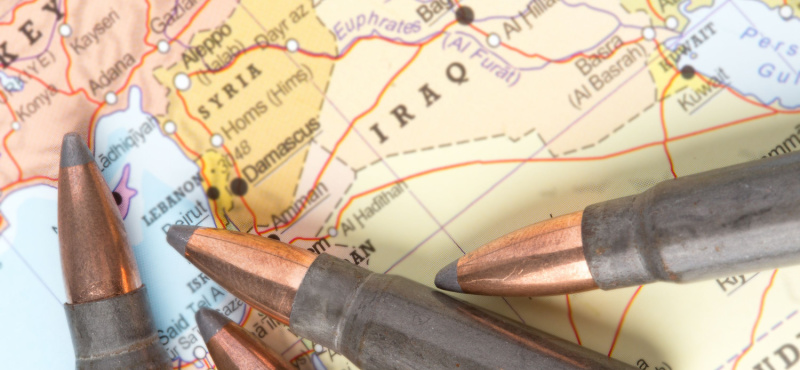Seventeen years ago this month, then-President George W. Bush backtracked on his earlier “Mission Accomplished” proclamation and sent 20,000 additional soldiers, along with almost as many private military contractors, to the war-torn country.
Troop surge planning began in 2005 after the Iraq War entered its second year with no end in sight. The plan moved forward, even though opposition to the war was strong in Congress, which the Democrats gained control of in the 2006 midterm elections. A resolution condemning the surge passed in the House and failed by four votes in the Senate.
The surge almost immediately produced results, not only because of the additional troops but also because of changes at the top. For example, counterinsurgency expert David Petraeus replaced George Casey, who was basically a career staff officer, as Commander of Multinational Force Iraq.
In many ways, Bush’s self-styled New Way Forward seems like light years ago now. Many people know it only from high school history books. However, many private military contractors who were injured during the surge, especially due to an occupational disease, still live with the memory every day.
Victory in Iraq
By the numbers, the troop surge worked. Despite the influx of troops, American casualties in 2008 decreased by almost 50%. By that time, lower casualties and limited stability had replaced Bush’s initial grand vision of total victory. Woodrow Wilson had a similar vision at the end of World War I.
A comparison between one of the most liberal presidents in history (Wilson) with one of the most conservative ones (G.W. Bush) seems off. But the two were similar in many respects.
Wilson believed that if the Allies deposed the Kaiser, the German people would embrace democracy, and the story would have a happy ending. But for reasons that were largely beyond his control, things did not work out like he had hoped.
Things started going wrong for Wilson during the peace negotiations following World War I. Georges Clemenceau, the French Prime Minister, wanted to harshly punish Germany. In fact, when he heard about Wilson’s Fourteen Points, Clemenceau scoffed, “The good Lord only had ten.”
Additionally, Wilson got the flu when he was in Paris. The peace negotiations took place during the height of the worldwide Spanish Flu pandemic, which dwarfed the coronavirus pandemic in terms of infections and deaths. Wilson contracted a strand that affected his mind as well as his body. So, when senators challenged the League of Nations portion of the peace treaty, Wilson refused to budge or compromise.
Most of us know how that story ended. The absence of the United States fatally weakened the League of Nations, and the harsh Versailles treaty helped pave the way for Adolf Hitler.
In 2003, when the Iraq War began, Bush sincerely believed that if the coalition deposed Saddam Hussein, the Iraqis would wholeheartedly embrace democracy. Not only that, he hoped that many people would shop at Walmart and go to church on Sundays.
That complete vision probably will not come true, at least not anytime soon. The jury is still out on the embrace democracy part.
Rebuilding Iraq
Contractors helped win a limited victory in Iraq. In fact, at some points in the conflict, private military contractors outnumbered regular servicemembers. Now that the shooting is mostly over, most regular servicemembers have gone home. But for many private contractors, the work is just beginning.
Post-World War I Germany needed little physical rebuilding. Invading armies never crossed the German border. Postwar Iraq is different. When American troops left for good in 2016, they left a very big mess behind. Contractors clean up such messes, usually by rebuilding infrastructure and providing ongoing security.
Hussein was a relatively popular strongman because he made the trains run on time, and as long as you did not get on his bad side, life in Iraq was tolerable. If a democratic government cannot deliver in this area, the next military strongman is only one coup away.
Rebuilding usually starts with public buildings and major roads. Smaller projects, like private buildings and side streets, come later. If contractors do the first part right, the second part takes care of itself.
Usually, overseas contractors supervise construction work. Supervision contractors often work for the same firm that planned the project. Therefore, everyone is on the same page.
As the United States has learned the hard way, wars do not end when one side stops fighting. The need for security in Iraq continues, especially since the country shares a border with Iran, which is probably the region’s biggest neighborhood bully.
Injury Compensation Available
Combat and non-combat contractors alike are eligible for Defense Base Act benefits. These benefits pay reasonably necessary medical bills and replace lost wages.
Private military contractors are eligible for these benefits if they were injured in an overseas war zone. Let’s break down these qualifications.
Most private military contractors work for a branch or division of the federal government, usually the State Department or the DoD. Other contractors are eligible as well, including unpaid ones, such as Peace Corps volunteers. Contractors who work for some sympathetic foreign governments are also eligible for DBA benefits.
The injury could be a trauma injury, like a fall or an occupational disease, as mentioned above. DRLD (Deployment-Related Lung Disease) is one of the most common Iraq War-related occupational diseases. The Veterans Administration often denies benefits in these cases, arguing that desert dust causes the victim’s illness. However, the Department of Labor, which administers the DBA, routinely approves DRLD claims.
An overseas territory is, well, an overseas foreign territory, at least in most cases. Some U.S. possessions, such as Guam, are “overseas” for DBA purposes. A war zone is any country or territory with any U.S. military presence, like an embassy guard.
For more information about DBA benefits, contact Barnett, Lerner, Karsen, Frankel & Castro, P.A.

